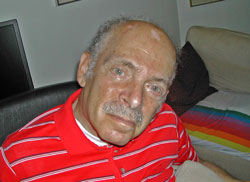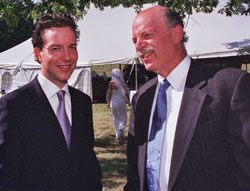Doug Tannenbaum
by Susan Tannenbaum
For the past four years I’ve been under house arrest, a prisoner of a disease that has taken over our home, my husband’s mind and body, and my life.
A recent article about caregiving for a spouse was titled The Roller Coaster Ride from Hell. I knew some of the people mentioned in this article and agreed with the title.
The first signs showed themselves just after 9/11. This would be in 2001, about eleven years ago. My husband Doug, aged 60, worked in the World Trade Center. He was late for work after an early morning meeting on Sept. 11th; he arrived just as the first tower fell. I worked in New Jersey just across the river, where I could see the whole thing from the upper floors of my building, but could not get into Manhattan, as all bridges and tunnels were soon closed. There was no telephone contact for much of that first day.
After the event, Doug became cloudy. That’s the best word I can think of to describe the process in its early stages. His handling of our business affairs, including the management of our building (a hundred year old brownstone) became more slovenly, his spreadsheets began looking pretty spotty, he was unable to answer a question directly, he neglected paying the mortgage, and he began falling.
He fell while standing, while sitting, while walking. He fell off chairs. He fell and fell and fell. In a short period of time, much of our furniture was reduced to splinters. He dropped dishes, he dropped food while eating, he dropped cell phones, remotes and eyeglasses. I bought him dozens of reading glasses. I took away his cell phone. I hid his car keys. I put plastic plates in the kitchen cupboard and removed all china and breakables from his reach.
All the while he denied everything. He would not hear of seeing a neurologist.
I confess that in the beginning it was easier for me to work around the increasing disability and pretend that this was just part of the ageing process.
The event that brought us into reality was a fall. Four years ago, Doug was walking home from a wine tasting one evening and fell on the sidewalk. He sustained a skull fracture and bleeding into his brain. In the hospital in a medically-induced sleep, he was finally in a position to be evaluated by a team of physicians, and I was finally able to speak with them about his condition. Denial was officially over.

As is often the case with PSP, the first diagnosis was incorrect. He had suffered a cerebellar stroke, said the neurologists, and would need rehabilitation after this hospital admission. After two months in hospital and rehabilitation, he came home and I found myself looking down into the familiar chasm: our lives are changed forever. Now what?
I will not describe the false starts, disinformation, uncaring doctors, avaricious agencies, my blind panic and attempt to hold my job during this process. I will say that my family was tremendously supportive and understanding. What I wanted during those bleak days was someone to put me to sleep for about ten years and simply take over my life. Of course, this was not to be. To attempt escape is futile. I learned to manage our real estate and to manage the illness. I began to work part-time. I relied on long talks with family members living far away.
We were able, after a few false starts, to get an accurate neurological diagnosis and to find a team of caring doctors to treat Doug’s many symptoms. Looking backward, of course he had PSP all along. Isn’t it easy in retrospect?
Over time, we have adapted. I got rid of the uncaring agency and hired three aides who are wonderful with Doug, bathing him, dealing with his incontinence, watching sports with him on TV, preparing his meals, and generally treating him with dignity and concern. I’ve joined a support group where everyone’s a caregiver and “gets it”. We have become family, visiting one another, helping out with wheelchair loans, referrals to various professionals, general love and support. Doug and I have become grandparents and are expecting another grandchild as I write this. From our congregation we have a corps of visitors who come to read and chat with Doug several times a week. He is now a regular at our local senior center. One friend calls often and reads to Doug over the phone.
Retired now, I have more time to be with Doug. Since travel is no longer a possibility, I’ve decided to grow an ambitious backyard garden, and regularly post photos of roses, snow peas, tomatoes, and herbs on my Facebook page. House arrest can become a viable lifestyle—no, not preferable, but certainly tolerable.
All I can say is this: take courage and stay connected at all costs.
